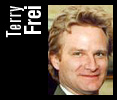 |

|
| Wednesday, October 9 Gretzky in L.A.: The Great Ripple Effect By Terry Frei Special to ESPN.com |
|||||||||||||||
|
The Fabulous Forum, contrary to the bragging name, was an archaic dump about 17 minutes after it opened. But on Hockey Night in Inglewood, Wayne Gretzky could turn it into a palace, because fabulous can be a state of mind.
Even if the NHL hadn't retired his number before the 2000 All-Star game, nobody was going to wear or even request the number again. So that's not the point. The point is that Gretzky rejuvenated the NHL in the U.S.'s No. 2 market, and like it or not, folks, the ripple effect reached Anaheim and Nashville and Tampa Bay and even Phoenix, where Gretzky now oversees the operation of the Coyotes. (That's such a ripple, maybe it's a tidal wave.) One of the misconceptions about U.S. markets, of course, is that the roots of hockey tradition are shallow. They're not. There are fans in the Staples Center now who remember, with considerable affection, the Los Angeles Blades of the old Western League, and those monumental matchups with the Seattle Totems, San Diego Gulls and the old Vancouver Canucks. The Kings now have been around over a generation, meaning kids in Redondo Beach and Pasadena and Thousand Oaks had the chance to admire Ralph Backstrom and Marcel Dionne and all the others. And, finally, the Southland is a transient area, and many hockey fans in the area were raised on the Bruins, or the Blackhawks, the Rangers, or even -- yes -- the Maple Leafs and Canadiens. So some of this talk about Gretzky converting a market has been overstated. He re-energized it, as only he -- and perhaps Mario Lemieux -- could do. In metro Los Angeles, the most flighty of markets, it was fashionable to talk of the Kings over the lunches at the Hotel Bel-Air before or even during the sitcom series pitches ("Think of it as the Cleavers, except Ward has a real job, June flirts with the pool boy, Beaver is in therapy and Wally is a grinding left wing.") At 2:15 in the morning, you could hear folks in line at Tommy's -- best hamburgers in the universe -- arguing about whether the Kings had a shot. And that wasn't just in 1993, when the Kings beat the Leafs in that exciting conference final and then lost to the Canadiens in the Cup final. It was a decade-long process, and Gretzky's breaking of Gordie Howe's career scoring record in 1989 remains one of the most memorable moments in Los Angeles sports. He hadn't been with the Kings that long, but he made the Southland fans feel as if they had been a part of it all -- because, whether as sports fans in general and hockey fans specifically, they had been. Gretzky didn't do it alone, but he was the centerpiece in a town that thrives on celebrity, that lives for People Magazine covers and visits to Johnny Carson's and Jay Leno's couches. More than anyone else, and in a way that has as much to do with a celebrity culture as with what he did on the ice, he was responsible for making the sport fashionable in Los Angeles.
In that context, Gretzky's continuing personal loyalty to the convicted, incarcerated and now released Bruce McNall, the owner of the Kings at the time of the trade and through the glory years, is admirable. One of the reasons for the delay in the retirement of No. 99 is that Gretzky wanted McNall to be a part of it, and for all of McNall's faults, his aggressiveness in bringing Gretzky to Los Angeles deserves to be saluted as well. It would be unrealistic to opine that without Gretzky's tenure in Los Angeles, the Kings, the Lakers and the Clippers -- and Bruce Springsteen, and Crosby, Stills, Nash and Young -- wouldn't have a state-of-the-art new arena. That was inevitable, except perhaps for the Clippers. But it is fair to say that the scenario probably would have played out differently, and the timetable would have been different. Anschutz's ambitious downtown rehabilitation project on land he owns near the junction of the Harbor and Santa Monica freeways indirectly is tied to Gretzky, who has continued to make his family's home in Thousand Oaks. Yes, by the time Gretzky was aching to get out of the organization, the Kings had slipped and the Forum was embarrassingly empty on many nights. But he showed what hockey could be in Los Angeles, given the chance and in the evolving standards of the modern sports world. Put up a building with luxury boxes and wet bars, give the town a decent team (or more), and the NHL could be a King. The Kings are not merely hanging a number in the rafters; they are acknowledging that Gretzky's Greatness can't be quantified in terms of awards, of goals and assists, of records -- or even the Kings' box-office receipts. Terry Frei is a regular contributor to ESPN.com. His book, "Horns, Hogs, and Nixon Coming," will be published by Simon and Schuster in December. It can be pre-ordered at Amazon.com or Barnesandnoble.com. |
| ||||||||||||||


 Identity Crisis
Identity Crisis